This includes national fiscal rules, independent fiscal institutions (IFIs), medium-term budgetary frameworks (MTBFs), fiscal statistics, the quality of public financial management and arrangements designed to support political priorities like, for example, the green transition and equal opportunities.
Why are national fiscal frameworks important?
Policy experiences show that strong fiscal frameworks and institutions can help contain the deficit bias in fiscal policy, can increase national ownership and stabilise economic expectations while also allowing budgeting to support specific priorities, for example, the green and digital transition and gender equality. Fiscal frameworks can support an efficient use of public resources by setting, for example, the conditions for efficient management of public investments and for monitoring the efficiency of public spending programmes. .
In 2005, within the reform of the Stability and Growth Pact, the European Council required EU Member States to strengthen their domestic fiscal governance through fiscal rules and institutions. National fiscal frameworks were further reinforced following the adoption of ground-breaking EU legal requirements such as the Budgetary Frameworks Directive, the Fiscal Compact and the regulation on Draft Budgetary Plans (Two-Pack).
Publications
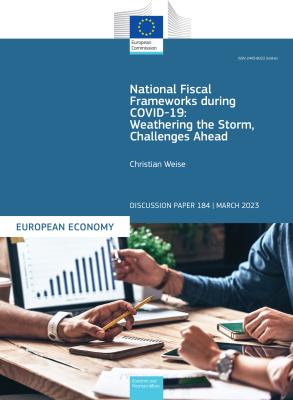
- Scientific paper
- Christian Weise, Directorate-General for Economic and Financial Affairs
This paper explains the changes to national fiscal frameworks done since the great recession and analyses how these frameworks have performed during the economic shock caused by the COVID-19 pandemic.

- Scientific paper
- Cristiana Belu Manescu, Directorate-General for Economic and Financial Affairs
This paper provides new evidence on public investment management practices in the EU, based on a survey with all EU Member States.
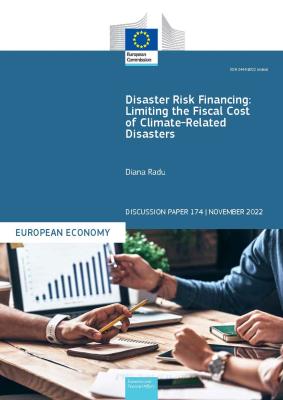
- Scientific paper
- Diana Radu, Directorate-General for Economic and Financial Affairs
This paper provides evidence on national disaster financing practices in the EU and non-EU Member States, along five elements leading to a disaster risk financing strategy.
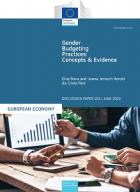
- Scientific paper
- Elva Bova, Joana Jerosch Herold da Costa Reis, Directorate-General for Economic and Financial Affairs
The paper reviews concepts used in analysing gender budgeting practices and provides country examples of these practices.

- Scientific paper
- Directorate-General for Economic and Financial Affairs, Cristiana Belu Manescu
The paper presents the theory of public investment management through a review of the literature. It discusses its main components, strengths and weaknesses of the process and provides specific country examples.
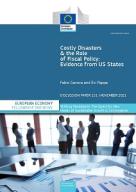
- Scientific paper
- Fabio Canova, Evi Pappa, Directorate-General for Economic and Financial Affairs
This paper provides study on the effects of natural disasters in US states and the fiscal reaction of both state and federal policy.

- Scientific paper
- Diana Radu, Directorate-General for Economic and Financial Affairs
This paper presents the theoretical approach to disaster risk financing and provides evidence from the EU and the EU Member States.
European Commission, Closing the climate protection gap – Scoping policy and data gaps, European Commission Staff Working Document, May 2021.
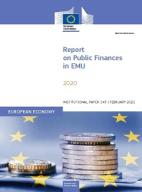
- Report
- Directorate-General for Economic and Financial Affairs
This annual report presents a review of key policy developments and analytical findings in the area of public finances.This annual report presents a review
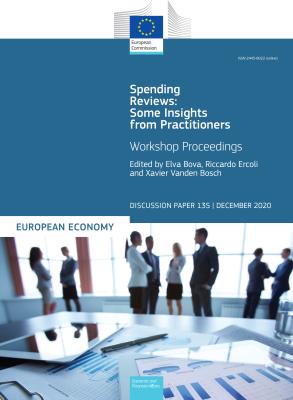
- Scientific paper
- Elva Bova, Riccardo Ercoli, Xavier Vanden Bosch, Directorate-General for Economic and Financial Affairs
This publication collects different experiences of spending reviews. It highlights challenges encountered by practitioners and puts forward possible...
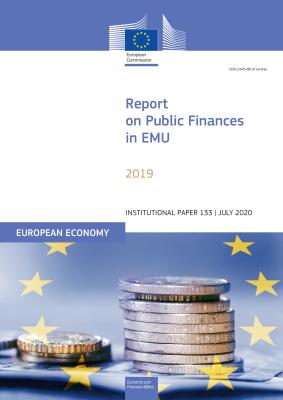
- Report
- Directorate-General for Economic and Financial Affairs
This annual report presents a review of key policy developments and analytical findings in the area of public finances.
European Commission, Review of the Suitability of the Council Directive 2011/85/EU on requirements for budgetary frameworks of the Member States, European Commission Staff Working Document, SWD(2020)211 final, 5 February 2020.
European Commission, Quality of public finances: Spending reviews as a key tool to enhance public investment in the Euro Area. Technical note to the Eurogroup, August 2019.
European Commission, Quality of public finances: enhancing ownership in spending reviews. Technical background note by Commission staff, May 2018.
European Commission, Quality of public finances: spending reviews for smarter expenditure allocation in the euro area, key insights from the April-May 2017 Commission survey addressed to euro area Member States (Note for the attention of the Eurogroup), June 2017.
Vandierendonck, C., Public Spending Reviews: design, conduct, implementation, European Commission, European Economy Discussion Paper 525, July 2014.
